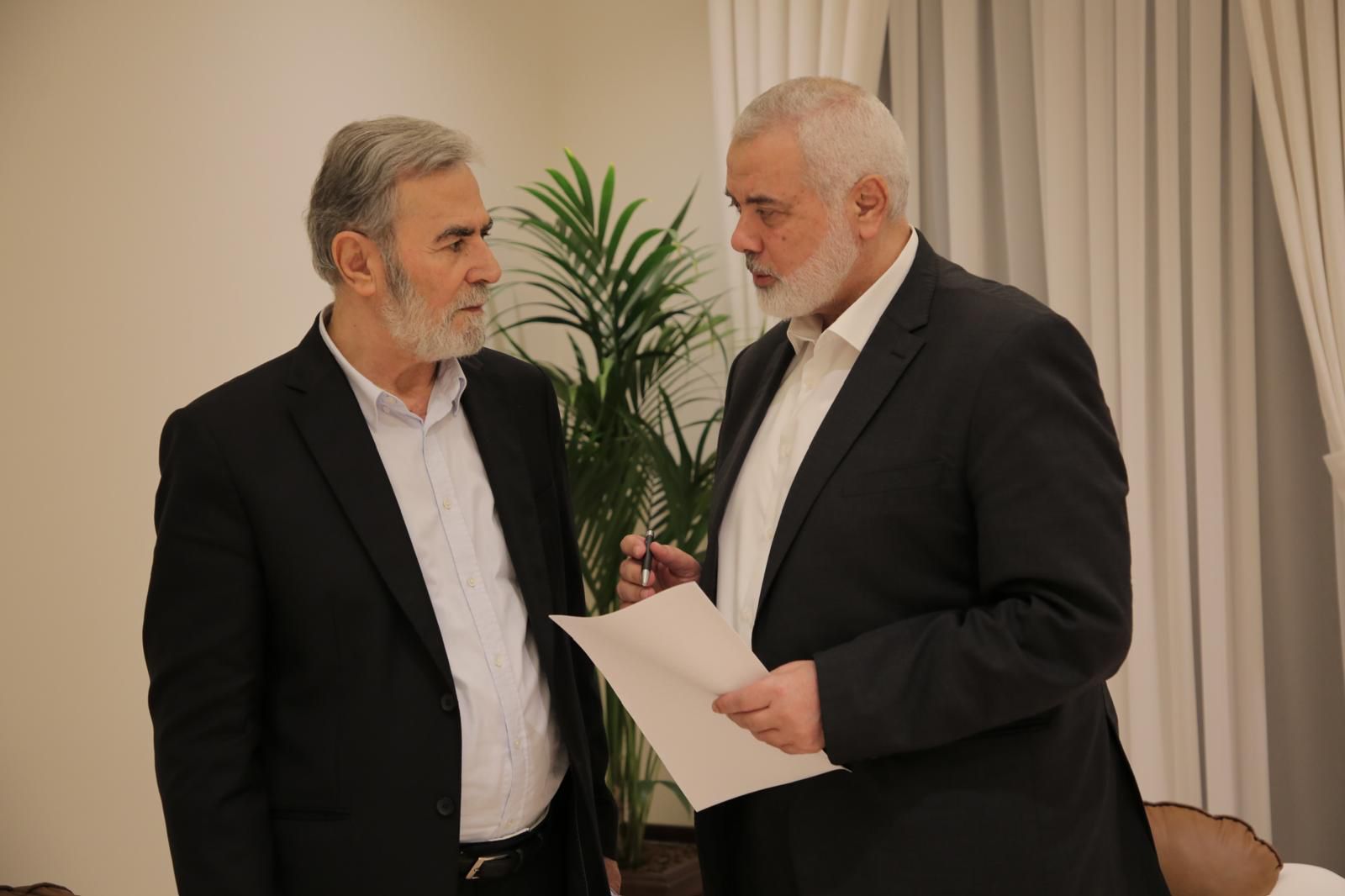On May 31, U.S. President Joe Biden presented the latest proposal, entailing a three-phased deal that would pave the way for a complete ceasefire in the Gaza Strip and the withdrawal of Israeli forces.
Hamas and the Palestinian Islamic Jihad have presented their response over the United States’ ceasefire proposal to mediators Qatar and Egypt, a day after the United Nations Security Council (UNSC) voted overwhelmingly on a resolution endorsing it.
In a statement on Tuesday, Qatar’s foreign ministry confirmed that both mediators received the response, but did not provide further details on the matter.
The head of Hamas’s political bureau, Ismail Haniyeh, and the Secretary-General of the Palestinian Islamic Jihad, Ziyad Al Nakhalah, submitted their response to Qatar’s Prime Minister and Minister of Foreign Affairs Sheikh Mohammed bin Abdulrahman Al-Thani during a meeting in Doha.
“The meeting discussed the response of Hamas and the Palestinian factions to the recent truce proposal, the developments in the Gaza Strip and the Occupied Palestinian Territories,” the Qatari foreign ministry said.
In a joint statement, Qatar and Egypt said that they were examining the response and that they would continue their mediation efforts along with the United States “until an agreement is reached”.
Top Hamas official, Izzat Al-Rishq, noted that the group provided a “responsible, serious, and positive” response to the mediators over the proposal.
“The Zionist media’s incitement to Hamas’ response is an indication of attempts to evade the agreement’s entitlements,” Al-Rishq said.
On May 31, U.S. President Joe Biden presented the latest proposal, entailing a three-phased deal that would pave the way for a complete ceasefire in the Gaza Strip and the withdrawal of Israeli forces.
Then, on Monday, the UNSC adopted a resolution over the U.S.-backed proposal following a 14-0 vote, with Russia abstaining.
The vote came more than eight months after Israel waged its brutal assault on the Gaza Strip – widely referred to as a genocide. More than 37,000 people have been killed, and the majority of the blockaded territory’s infrastructure and buildings have been destroyed, resulting in a humanitarian disaster. Furthermore, most of Gaza’s 2.3 million population are currently displaced.
Washington has previously used its veto power to block at least three UNSC resolutions that called for an immediate ceasefire in Gaza.
Hamas was quick to welcome the UNSC vote and voiced its readiness to cooperate with mediators to take part in indirect talks with Israel over the plan’s implementation.
The three phases proposed by Biden would last for six weeks each.
During the first phase, a six-week ceasefire would take place to enable the release of Israeli captives held by Hamas, including the remains of those killed, as well as Palestinian prisoners in Israeli jails.
Negotiations would take place throughout the first six weeks and Israeli forces would withdraw from populated areas in the Gaza Strip. The same phase would allow Palestinian civilians to return to their homes and enable the “safe and effective distribution of humanitarian assistance”.
The UNSC noted that the ceasefire will take place even if the negotiations take longer than six weeks for phase one.
The second phase would result in “a permanent end to hostilities” in exchange for the release of all other captives in Gaza and the full withdrawal of Israeli forces.
By the third phase, a “multi-year reconstruction plan for Gaza” would begin and the remains of all other captives would be returned to their families.
The cost of damage to Gaza’s infrastructure during the first four months of the war alone was estimated at $18.5bn, according to a March report by the World Bank and the UN.
Housing units account for 72 percent of the damage costs, or $13.3bn, whereas public service, energy, and water facilities have suffered nearly $800m in damages.
A report by the UN Development Programme last month revealed that Gaza would require 80 years to reconstruct fully destroyed housing units.
Israeli forces have sealed off all entry points to the Gaza Strip, and restricted the flow of essential supplies such as food and medicine, leading to widespread hunger and the threat of famine among Palestinians.
On Tuesday, Jordan hosted a humanitarian conference titled “Call for Action: Urgent Humanitarian Response for Gaza” aimed at garnering support for the besieged enclave’s humanitarian situation.
In his opening speech, King Abdullah emphasised the dire situation facing Palestinians in the Gaza Strip, stating that the level of death and destruction surpasses that of any conflict in the past two decades.
He also underscored the urgency of humanitarian access, asserting that it cannot be delayed until a ceasefire is reached and should not be politicised by any party’s agenda.
Qatar’s prime minister was also in attendance, and thanked the Jordanian monarch for their efforts in finding a resolution to Israel’s war.
“We support all cooperation and efforts done to end the war and find a unified response to the situation in Gaza. Thanks to the Kingdom of Jordan and the international partners for all their efforts,” Sheikh Mohammed said on X.


